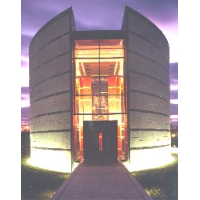Heritage Lottery Fund grant for Ruskin Library

The Ruskin Library has been awarded a grant of 181,500 from the Heritage Lottery Fund for a major conservation project. Over 400 drawings and 125 historic early photographs will be properly conserved and made available for display at the Library and in future touring exhibitions. Together with an education programme proposed by the Ruskin Foundation, this will bring to an even wider audience the remarkable collection now housed at Lancaster.
The HLF provided most of the funds for the Ruskin Library, formally opened in 1998 by HRH Princess Alexandra, Chancellor of the University. Its striking design has led to its acknowledgement as one of the best buildings of the decade: it won the Universities section of 1998 Royal Fine Art Commission/BSkyB Building of the Year competition and has received Civic Trust, RIBA and Lancaster Design awards.
As well as providing materials for research and teaching purposes within the University, and servicing the new MA course in Ruskin Studies, administered through the Ruskin Programme, the Library has a gallery open to the public seven days a week, throughout the year. This allows for changing displays from the collection, as well as the opportunity to host loan exhibitions. The programme for 2001-2 will include an exhibition of new paintings by Julie Roberts, who is completing a 'Ruskin Project' as part of an AHRB Fellowship, and one on 'Ruskin and Northern France' which will travel to the Musee de Picardie in Amiens.
The main holding of the Ruskin Library is the collection established by the educationalist John Howard Whitehouse and now under the care of the Ruskin Foundation. It is the largest single collection of material relating to the writer and artist John Ruskin (1819-1900), and comprises over 2000 drawings by Ruskin and his associates; more than 8000 manuscripts (including 29 volumes of Ruskin?s diaries); several hundred historic photographs; and a uniquely comprehensive holding of books by and about Ruskin.
The Curator, Stephen Wildman said he was delighted that the HLF had offered further funding.
"It's splendid to have such a fine building in which to keep and show the collection, but much of the material needs specialist cleaning and repair, and it will be an even greater boon to have so many individual items brought into use for the future.
?Ruskin was an early champion of the daguerreotype - an early form of photograph on a metal plate, each one of which is unique - and this group is among the most important in the world."